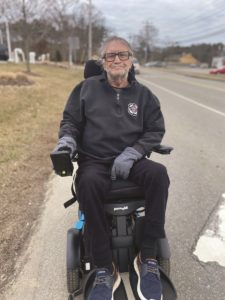WELLFLEET — When 84-year-old Carmen Castro had a major stroke in 2017 and needed full-time care, her daughter, Belinda, quickly stepped up, adjusting to the 24-hour routine of administering medication and driving to medical appointments. What she didn’t expect was the additional burden of advocating for her mother’s rights.
From finding an affordable and accessible year-round home, to locating nearby resources like day programs, Belinda says she spends a lot of time trying to get what’s promised by the Americans with Disabilities Act (ADA).

“It would be nice to turn to someone to help you understand your rights,” she says. “Fighting that fight alone, along with taking care of someone, has taken a toll on me.”
The ADA prohibits discrimination against people with disabilities, but the law is not well enforced, advocates say. Town officials can play a role in improving that situation.
Towns with more than 50 employees must have an ADA coordinator to help residents file grievances under the law with the U.S. Dept. of Justice, should they need to.
Often, people don’t know that the coordinator position exists, however. When struggling to make her unit in an affordable housing development accessible, Castro reached out to Wellfleet staff but was shuffled from person to person, she said. Castro said it did not occur to her to ask to speak to the ADA coordinator.
If she had done so, she might not have found one. On March 4, after 14 months without an ADA coordinator, Wellfleet appointed Rebekah Eldridge, the town secretary and water department clerk, to fill that role. She replaces Assistant Town Administrator Courtney Butler, who left her job in December 2020.
Wellfleet, which has 116 full-time employees, is the only Outer Cape town to go without an ADA coordinator in recent history. But Eldridge’s appointment is no guarantee that the problems people with disabilities face will be solved.
For one thing, most ADA grievances aren’t processed for years, said Salem State School of Social Work Professor Elspeth Slayter of Provincetown. Slayter’s work at Salem State focuses on disability services.
Fred Genter, a member of the Wellfleet Commission on Disabilities for 18 years, uses a wheelchair. He told the Independent that going by the book and filing an ADA grievance “doesn’t mean it will be solved in your lifetime.”
An ADA coordinator should be a point person, but some towns have better ADA coordinators than others, said Genter. He said he has never filed an ADA grievance, preferring to deal with any deficiencies directly by picking up the phone. If he sees an automated door at the library that’s not working, for example, he’ll reach out to the local dept. of public works.
Genter, 75, is a can-do guy who got on his hometown disabilities commission after his wife “basically got tired of me complaining to her,” he said.

Mike Andrews, who lives in Eastham and is confined to a motorized wheelchair due to Machado-Joseph disease, said he struggles regularly to navigate on the sidewalks along Route 6 and to cross the highway to do his errands. Still, he said, he has never considered filing a grievance.
Andrews, who grew up in Provincetown and captained the Alaskan scalloping vessel Provider until his disease progressed, said he doubts it would do any good.
Not every improvement depends on this cycle of ADA grievances. In 2017, the section of highway next to Andrews’s house was declared a District of Critical Planning Concern, according to the Cape Cod Times. At that time, local officials and Cape Cod Commission planners met to come up with zoning regulations and incentives to improve the area for all motorists and pedestrians.
Eastham Town Administrator Jacqui Beebe said the town is in the process of doing an engineering study that includes roads, sidewalks, and curb cuts. The state handles sidewalks along Route 6, but has “no plans to renovate,” Beebe said. “We decided if we want any changes, we will have to do the engineering and then bring it to them.”
From Andrews’s point of view, the bottom line is that four years later “nothing has happened,” he said. ADA or not, he’s not sure it ever will.



